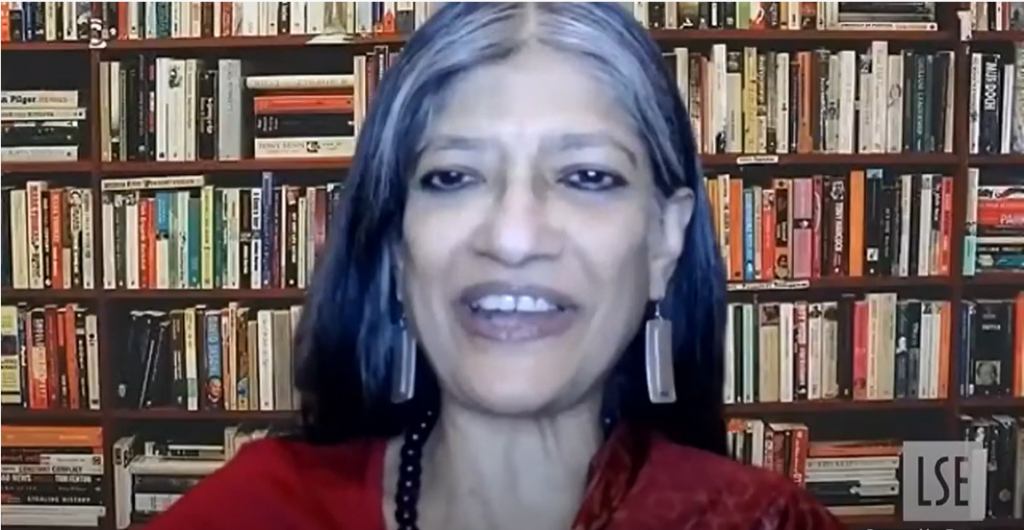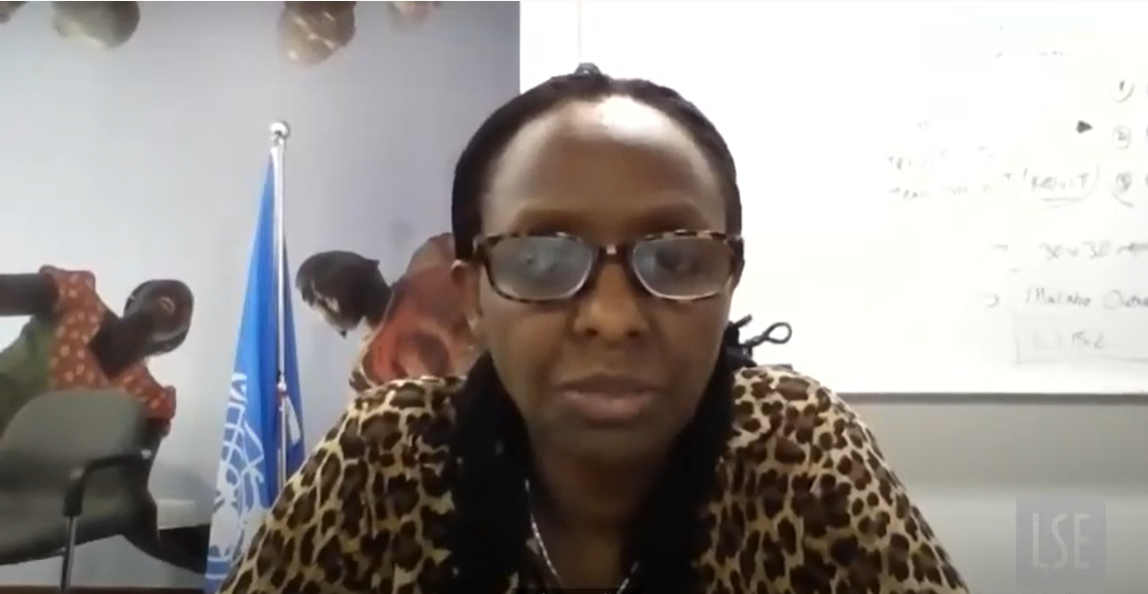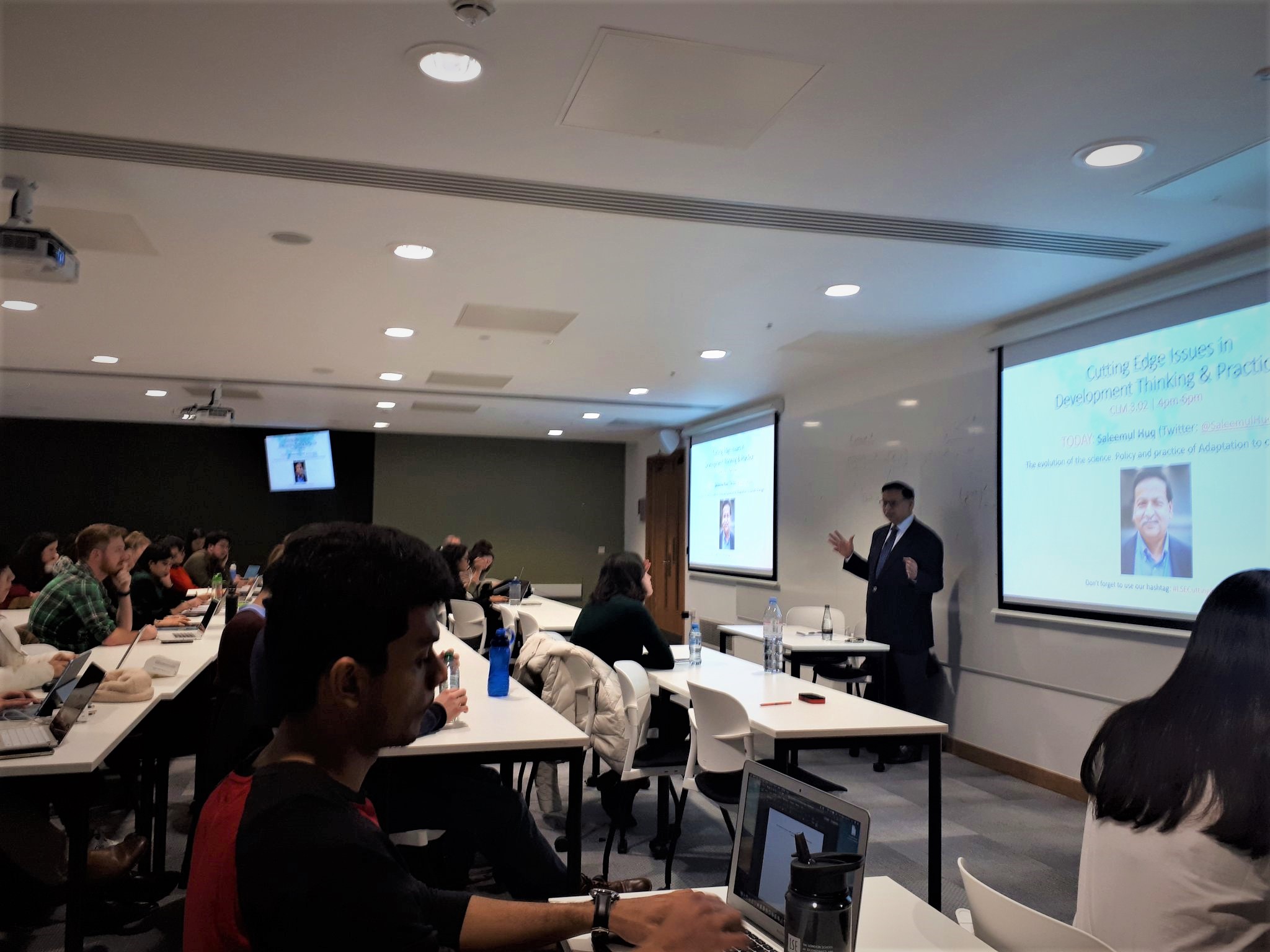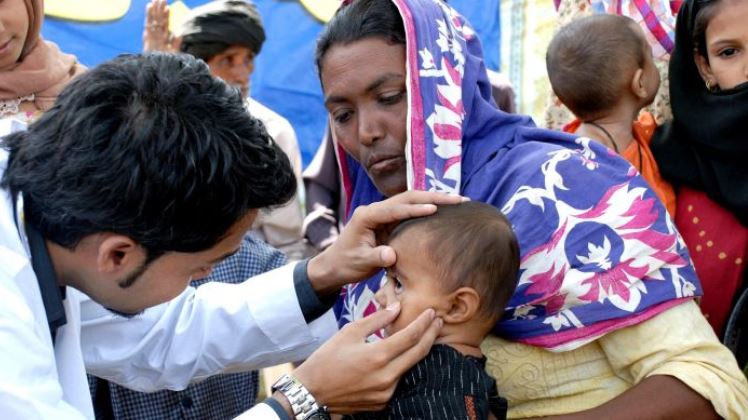On Friday 12 November, Jayati Ghosh gave an online lecture on ‘Access to vaccines and the limiting role of intellectual property rights and pharma monopolies’ as part of the Cutting Edge Issues in Development Lecture Series for 2021/22. Jayati Ghosh is a professor of Economics at the University of Massachusetts Amherst. Visiting Professor at the Firoz Lalji Institute for Africa and former Chief Executive of Save the Children UK, Kevin Watkins was an invited discussant for the lecture. Read what MSc students Alya Ali Akbar, Devika Agarwal, Victoria Ehrlich-Adam and Hridya Rajesh took away from the lecture below.
You can watch the lecture back on YouTube or listen to the podcast.

The lifting of lockdown measures and the resumption of large-scale gatherings have given rise to an illusion of safety that fosters a widespread impression that the pandemic is now over. Yet as Professor Jayati Ghosh demonstrated, this illusion only prevails among 14% of the world’s population who live in rich countries. Before vaccines were developed, rich countries placed advance orders on 85% of them. While most of these vaccines were developed in publicly funded labs, they have now been patented by big pharma companies. Reiterating the logic that “no one is safe until everyone is safe”, Professor Jayati Ghosh voiced a common frustration in the global health community with wealthy governments who fail to consider the implications of vaccine hoarding. Without international cooperation and vaccine solidarity, she stresses, the pandemic is unlikely to move beyond short-lived illusions of safety in select parts of the world. Disconcertingly, this global landscape of vaccine apartheid is a breeding ground for new variants, and the emergence of the next catastrophic variant is “only a matter of time”.
How much time exactly depends on our capacity to distribute more vaccines to more people. In theory, the COVID-19 Vaccines Global Access Facility (COVAX) could execute this task, but Professor Ghosh explained why it hasn’t done so successfully. COVAX is a global fund exclusively designed to orchestrate the delivery of vaccines to people in low-income countries free of charge. Alongside the claims of many who argue that it was flawed in its initial design, it was also significantly underfunded, raising only 5 out of the 24 billion that was required. Professor Ghosh illustrated how this was largely due to bilateral deals that were negotiated between country governments and pharmaceutical companies. If a country like Canada could offer more than COVAX could for a bulk of Pfizer’s doses, Pfizer would sell to them instead. The ramifications of skewed global distribution processes of this nature have manifested in the following outcomes:
- Canada has 11 times the amount of vaccines it requires for its population
- Three-quarters of available vaccines are held by 10 countries now sitting on larger than necessary stockpiles
- Countries are throwing excess vaccines away rather than sharing them with other countries
According to Professor Ghosh, these are some of the reasons why we are nowhere near solving the pandemic for the other 86% of the world.
At this point in the talk I thought to myself “surely, there is at least one functioning system of accountability in global health. How can the actors in these blatantly unfair, not to mention unethical, incidences of vaccine hoarding and wasting go by completely unscathed?”. Then came the part of Professor Ghosh’s talk that I refer to as: “patents, politics and empty promises” which answered my questions. She explained the story of the Oxford AstraZeneca vaccine which was developed in an Oxford publicly funded lab, for public purposes. In fact, the vaccine was initially developed with the intention of being entirely open-sourced. That was, until, the Gates Foundation gave 45 million pounds to Oxford university and persuaded them to enter into a deal with a single pharmaceutical producer, AstraZeneca, to which they transferred all their knowledge rather than leaving it open for public use. AstraZeneca, despite holding the patent, promised not to make profits from it. This promise lasted up until last week when AstraZeneca announced that they would no longer forsake profits since, according to their research, the pandemic is now over. Their vaccines will now become chargeable.
The theme of power politics begins to unravel more clearly when Professor Ghosh presented the case of 142 countries advocating for compulsory licensing of all COVID-related products during the pandemic. Compulsory licenses are “authorisations granted by a government to a company to produce a product without the consent of the person who holds the patent”. This means that, in theory, Intellectual Property laws can be waived on anything related to the pandemic; for instance, a waiver would eliminate any approvals that might be necessary to replicate the creation of an mRNA vaccine. However, Professor Ghosh explained how this is a very limited request as the World Trade Organisation (WTO) does officially allow compulsory licenses. The problem is that when weaker governments accuse pharmaceutical companies of monopolistic behaviour, their home country governments (which are almost always in advanced economies) will often raise complicated litigations to protect them. As a result, few calls for compulsory licenses have any real impact. Even though it would be in the interest of richer countries to support these compulsory licenses, as increasing their supply would reduce the cost for governments and taxpayers, they continue to oppose them. This translates into a myopic refusal to share knowledge and technology that is imperative in bringing the pandemic to an end.
However, Professor Ghosh noted, if big pharma has capitalised so tremendously on the pandemic, why would it want it to end? Firstly, they increase the scope of the people who require vaccines; it is not strictly obvious that children require vaccinations. Secondly, they introduce boosters as when new variants have emerged, the effectiveness of our existing vaccines tended to decline. Boosters are offered so that people with around 70% protection can regain the 98% protection they were initially offered to make it through the rough months of winter. Meanwhile, most people in the global South have been living through one long, rough winter since the start of the pandemic. At the moment, Professor Ghosh stressed that the concentration of vaccines in the global North, the blocking of compulsory licenses, the refusal to share, the tilting of the global health order in the favor of rich countries and their pharmaceutical producers, is not just unfair. It is quite literally killing people. Urgent action needs to be taken to ensure the equitable provision of vaccines across the world, and Professor Ghosh proposed some suggestions:
- Any country with a vaccine uptake above 50% should redistribute their existing stocks as soon as possible
- COVID-related technologies should be scaled up and accessible to all without legal constraints
- Companies must share their knowledge and transfer technology (for a reasonable fee)
- Supply chains need to be made more resilient by generating decentralised production clusters
- Industrial policy needs to be strengthened on a regional basis as we realise charity and solidarity cannot be relied upon in times of crisis
Ultimately, we are witnessing the interplay of self-centred actors in an unjust and disingenuous global health system that some are unaware of, many are complacent towards, and most are hopeless against. The practical solution to this, as proposed by discussant Kevin Watkins, is to think about the narrative that can win the public debate on COVID in a context that is hostile to international cooperation.
Alya Ali Akbar
_______________
Jayati Ghosh, Professor of Economics at the University of Massachusetts, and author of ‘The making of a catastrophe: Covid-19 and the Indian economy’ joined LSE on Friday 12 November to talk about pharma monopolies and their impact on vaccination distribution across the developing world. The discussion was topical and enriching, especially with high-income countries receiving booster shots, while too many people in low- and middle-income countries have not even seen any sign of a vaccine.
“Some viruses are more equal than others”, as shared by Jayati Ghosh in her introduction. She discussed how the nature of Covid-19 and its response reflect deep-rooted global inequality and its power imbalances. The lecturer argued that because rich countries were affected most severely in terms of morbidity and mortality rates by the first wave, the measures taken were designed for more advanced economies. China, for example, has strong and controlled regulatory systems and provisions for social security programs that supported the lockdown strategy. In developing countries, however, there are large informal sectors, fewer remedies for social protection and highly concentrated, undeveloped living conditions make physical distancing difficult.
The following parts in her discussion argue that the second and third waves have been more devastating in the Global South due to the vast inequalities in vaccine development and distribution. 90% of the Research and Development (R&D) required to produce mRNA vaccines was done in publicly funded labs by public researchers. Only the last elements of the research process were carried out by private companies, through public funding, and included massive amounts of subsidies. The United States of America and Germany were the largest investors in COVID-19 vaccine R&D, pouring in approximately $2 billion and $1.5 billion respectively. BioNTech and Pfizer, who developed the first COVID-19 vaccine received about $800 million. Out of $5.9 billion spent until March 2021, approximately 98% was public funding given to private companies.
High-income countries account for just 14% of the world population. But, by October 2020, rich countries had grabbed almost 85% of the production capacity of one year from the six main producers, with Canada booking vaccines more than 10 times its population. In some countries, excess vaccines are being thrown away and wasted, whereas in Africa less than 5 per cent of the population has been vaccinated. Whilst India has its manufacturing capability only 30% of people are fully vaccinated. Jayati Ghosh emphasised the problem of the vaccine grab by rich countries not only due to shocking power imbalances and disregard for developing countries. She relevantly stated that a virus does not recognise a nation and that it is a “no brainer” that a pandemic can only be overcome when it is overcome everywhere. So why are we not sharing our research and resources to distribute Covid-19 vaccines around the globe?
To counter the problem of vaccine apartheid and inequity, the COVID-19 Vaccines Global Access Facility (COVAX) was created to prevent hoarding by rich country governments and ensure equitable access. It was led by the World Health Organisation (WHO), the Coalition of Epidemic Preparedness Innovations and GAVI (the Vaccine Alliance). However, the initiative failed. It was majorly underfunded and had a design flaw that allowed governments to negotiate bilateral deals with pharmaceutical companies for their gain. Developing countries often ended up paying more than advanced countries, with the cost of AstraZeneca in South Africa being $5.25, but only $3.59 in the EU.
Moreover, Jayati Ghosh discussed that vaccine supply was limited at first because patent rights gave big Pharma companies a monopoly on production. Whilst patents are supposed to reward innovations, under the World Trade Organisation’s (WTO) rationale, the big pharma companies have received massive government subsidies to develop the vaccines. AstraZeneca was originally developed in Oxford with the sole purpose of being made publicly available. However, with the Gates Foundation contributing funds to Oxford for scientific development and persuading them to go with a single vaccine manufacturer, AstraZeneca holds the patent now and decides on its distribution. Essentially “patents are killing people” and because countries are thinking nationally and regionally, new threats will keep on arising.
In response, Kevin Watkins, visiting Professor of Practice at the Firoz Lalji Institute of Africa at LSE and former CEO of Save the Children UK, talked about the abuse of market power by rich countries. The corporatisation of multi-lateral trade rules, he believes, is the heart of the problem. He pointed out that:
- Booster shots are a way of using the excess supply in developed countries, despite people in developing countries not having received even the first dose.
- Johnson & Johnson exporting vaccine doses from South Africa to European Union, and the South African Government is warned that any attempt for disruption will be met with trade sanctions.
- The role of pharmaceuticals in international markets is divergent and different from public interest in this area, Pfizer having written the Intellectual Property rules currently enshrined in multilateral trade during the Uruguay Round of Trade Negotiations.
Kevin Watkins’ book recommendation Plagues and People is a must-read to highlight the level of cooperation that was happening in the 19th century, which the world of today is not operating under. The very countries that organised COVAX have actively undermined it, fostering a massive loss of credibility in higher countries. He continued to highlight the urgency for international cooperation and public accountability in challenging the inherent power dynamics and operating against structural inequities. Both the northern populations and southern operations need to challenge these monopolies. The development of a vaccine in Cuba highlights the possibilities of developing countries and leaves us hopeful that with further investment and support, resources can be developed on a global level to answer the threat of pandemics.
Both Jayati Ghosh and Kevin Watkins believe that one of the ways forward is the Trade-Related Aspects of Intellectual Property Rights (TRIPS) waiver (not surprisingly, Jayati highlighted that even the TRIPS waiver was only being opposed by countries in the Global North). Yet, the transfer of technology to manufacturers in other Low-to-Middle income countries (LMICs) is urgently necessary and there is a need to move beyond compulsory licensing. Private companies need to share their knowledge and data, to foster local manufacturers. At the same time, shareholders and investors need to hold companies accountable for defending public interests. Whilst pharma companies are profiting left and right, conditionalities need to be imposed to oppose the monopoly reigning in pharmaceutical governance. In times of climate change, humanity will not survive without global cooperation and solidarity; the politics of the world require a “rethinking.”
Devika Agarwal & Victoria Ehrlich-Adam
_______________
The Covid-19 pandemic has widened the chasm of inequality in the world. Access to vaccines, lockdown measures and even the recovery of countries from the pandemic has shown us the power balance within and among nations. Jayati Ghosh, in her lecture as part of the Cutting Edge lecture series, sharply brings light to this divide and the role that pharmaceutical companies and intellectual rights play in perpetuating this cycle of inequality.
Ghosh began by speaking about the pace of vaccine development during the pandemic. Speaking about the three major waves that happened in the world, she pointed out how the North-South divide became apparent with the second and third waves. “Both the nature of the disease and the nature of the response reflected global inequality and the power imbalances,” she says. While the mortality and excess deaths went up exponentially in developing nations, developed countries had largely hoarded up vaccines. Canada, for example, purchased almost eleven times their requirement of COVID-19 vaccines. Rich countries have been able to use their market power to corner the supply of vaccinations, now securing booster doses when a large majority of the developing world is unvaccinated.
For me, it was extremely interesting to note the role of multilateral organisations in crises such as these. Ghosh pointed out how ‘COVAX,’ an organisation of the WHO that was meant to ensure equitable distribution of vaccines to all nations failed in its mission. Bilateral agreements between private companies and countries resulted in the hoarding of the vaccines a few months before the rollout had even begun. The role of monopolies, from the private sector, pharmaceutical giants and governments alike, disrupted the distribution of vaccine production and delivery. This forms the main body of Jayati Ghosh’s address. Ghosh spoke of how we must question not just the economics, but the politics of the world and society in crises like this.
It is striking to understand the role of pharmaceutical companies during the pandemic. While public funding was used to create the vaccine, the production of the vaccine was entirely monopolised by pharmaceutical companies. This was then protected under intellectual property rights during the pandemic, preventing other bodies from entering the production process. This effectively limited the number of suppliers, keeping the prices of the vaccine high. Ghosh noted how this is a failure of governments and multilateral agreements alike, as their utmost priority should be ensuring public goods for their people.
How do we value global health commons today? By monopolising and actively guarding the knowledge of vaccine production, are we not prioritising economic rents and profits over lives? Jayati Ghosh leaves us to question global power imbalances with these sharp observations. In the light of impending health pandemics and crises with catastrophic consequences such as climate change, countries and pharmaceutical companies alike must rethink their actions so as to not value profits over people. In a talk that left us with much to question, Jayati Ghosh shared her views with the rapt audience at LSE ID’s Cutting Edge Issues lecture series.
Hridya Rajesh
_______________
The next guest lecture will be with Agnes Kalibata on Friday 19 November 2021 on ‘Paradigm shifts in food systems’. LSE Students, Staff and Alumni can register here. External audiences can join the lecture via YouTube.
The views expressed in this post are those of the author and in no way reflect those of the International Development LSE blog or the London School of Economics and Political Science.





